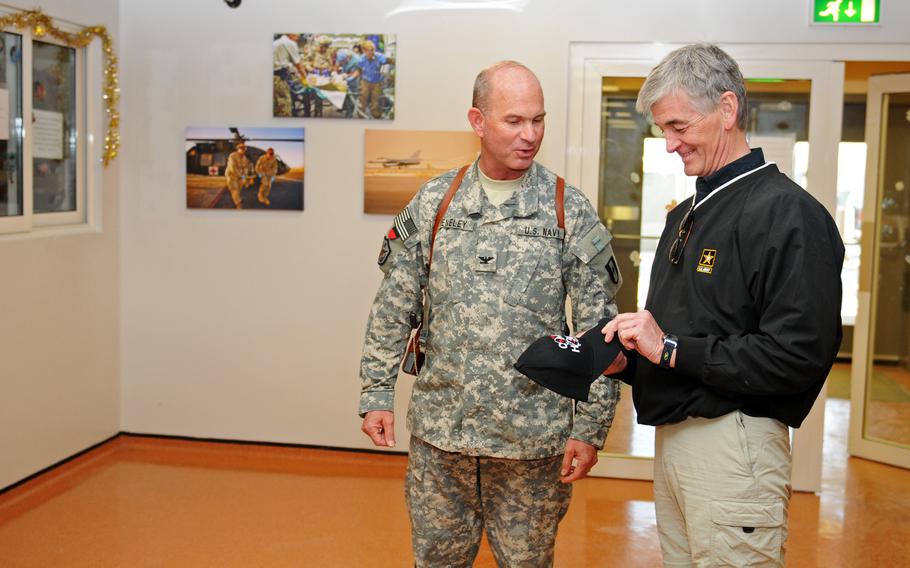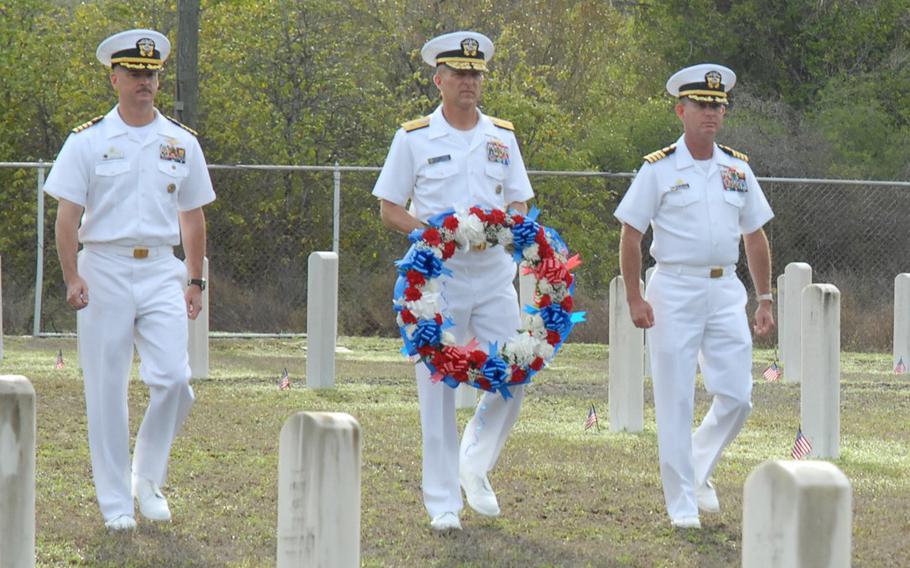
Navy Capt. Bruce Meneley of Task Force Medical- South and NATO Role 3 Multinational Hospital commander, gives a “Combat Hospital” hat to Army Secretary John McHugh at Kandahar Airfield, Afghanistan, on Dec. 14, 2011. “Combat Hospital” was a Canadian television show that featured medical units in the warzone. Meneley, who retired in 2016 as a Navy captain having earned dozens of awards and commendations, died when he was shot multiple times by police at a DoubleTree hotel in a suburb south of Seattle. (Amanda M. Mills/U.S. Army)
Bruce Coval Meneley was a teenaged seaman in Reno the year after Saigon fell to the North Vietnamese. He rose to ensign, graduated medical school, served in Operation Desert Storm, Iraq and Afghanistan and commanded a Navy hospital at Guantanamo Bay, Cuba. By the time he retired in 2016 as a Navy captain, he had earned dozens of awards and commendations, including a Bronze Star and two Legions of Merit.
His life ended on the afternoon of April 17, when he was shot multiple times by police at a DoubleTree hotel near Seattle in a child sex sting operation. Police video shows a man authorities later identified as Meneley pulling a gun on officers trying to arrest him after he showed up at a room where he planned to meet two underage girls. Police said Meneley had come to the attention of authorities in previous sex crime investigations.
The sting
The Seattle Police Department, which leads a statewide Internet Crimes Against Children Task Force, said they set up a sting in Room 1513 of the Doubletree Hotel near Seattle-Tacoma International Airport.
“Officers were waiting to arrest the 67-year-old white man when he arrived at the hotel room, where he thought he was meeting two young girls, seven and 11 years old,” Seattle Police Chief Adrian Diaz said in a statement.
The three Seattle police officers waiting for the suspect in the room each wore body cameras and black uniforms that clearly identified them as police.
At 3:13 p.m., a man appeared on the hallway of the atrium-style hotel, according to videos posted by police on YouTube.
The officers answered the door, and within 15 seconds, Meneley was dead, police said. One officer was wounded as guests hid from a fusillade of up to 30 bullets above the open-air lobby.
The shooting
Police posted videos of the shooting on YouTube on April 19 — two days after the shooting — with an introduction by Chief Diaz.
“For our officers, these situations are dangerous, unpredictable, and can escalate rapidly,” Diaz said. “We want to warn you what you’re about to see is disturbing.”
A few moments into the videos, the picture switches to inside the hotel room. The shooting unfolds three times from the body cams of the three officers involved.
The videos show officers opening the door to Room 1513. Outside is a man in a baseball cap, dress shirt, jeans, and a light green jacket standing in the entryway with his right hand across his chest and inside his coat. Police blurred the man’s face.
Seattle police officers start to identify themselves, but the man backs up and pulls a handgun from his pocket. Officers grapple with him and grasp the pistol to turn the muzzle back towards the man.
There is a single gunshot.
“Gun!” the officer shouts, holding the man’s hand, then firing what appears to be two shots from his gun. Officers flanking the man pull their pistols and fire several shots — television station Fox 13 counted about 30 — that explode and echo through the high atrium.
The last video shows the third officer who unloads the full magazine of his semi-automatic pistol into the blurred body before quickly reloading. Down the hall is another officer, apparently grazed by a bullet, who seeks cover behind the wall.
An officer is heard reporting on a radio, “Shots fired, shots fired,” then saying, “Suspect down, help the officer.”

Navy Capt. Bruce Meneley, then-Guantanamo Bay Navy Hospital commanding officer, far right, with Navy Capt. Steven Blaisdell, U.S. Naval Station Guantanamo Bay commanding officer, far left, and Navy Rear Adm. Dave Thomas, Joint Task Force Guantanamo commander, middle, place a Memorial Day wreath at Cuzco Wells Cemetery, Guantanamo Bay, Cuba, May 25, 2009. (U.S. Navy)
The sailor
According to Meneley’s personnel file obtained from the Navy Personnel Command, he enlisted in the Navy and served nearly seven years at the Navy Reserve Center in Reno, Nev. In 1982, he was assigned to the Naval Reserve Service until 1986, during which time he received a medical degree from the University of Nevada, Reno.
After short stints at the Naval Medicine Readiness and Training Command in Bremerton, Wash., he was transferred to Port Hueneme in California, then to Naval Support Forces at Munro Sound in Antarctica for nearly a year.
In December 1989, he reported to Long Beach for service aboard the World War II battleship USS Missouri, which had been converted into a cruise missile launched platform. During Operation Desert Storm in 1991, Meneley served aboard the ship off the coast of Saudi Arabia.
From April 1992 to September 1998, he was assigned to medical command roles at Navy and Marine units in San Diego and Twentynine Palms in California.
Promoted to captain in July 2003, he was sent to the Naval Leadership and Ethics Center in Newport, R.I., before a three-year stint at Naval Readiness and Training Command in Quantico, Va.
Meneley was then dispatched at the end of June 2007 to the high-profile job of hospital director at the Navy base at Guantanamo, Cuba.
After leaving Cuba, he was sent to San Diego with Naval Surface Force Pacific and was later deployed to Kandahar Province in Afghanistan, commanding a new medical facility staffed by an international NATO contingent.
On June 30, 2016, he retired after just over 40 years in service.
The suspect
Few records were available for his life after Meneley retired. He was recently living in Hansville, a small town at the top of the Kitsap Peninsula on Puget Sound, about 32 miles north of Bremerton.
The peninsula is home to the carrier USS Nimitz and the Puget Sound Naval Shipyard at Bremerton. Across the peninsula at Bangor is the submarine base where 10 Ohio-class nuclear ballistic or guided missile submarines and two Seawolf-class nuclear submarines are stationed. The Pentagon has about 15,000 active duty personnel, primarily Navy, spread around the 12,000-acre base that is the third largest Navy installation in the United States. It’s also home to a large number of retired personnel.
In 2017, police records show Meneley was arrested in a Bremerton Police prostitution sting, and a telephone number connected to him was noted as having called at least two separate prostitution houses. Meneley told authorities he was married and had been arrested for soliciting prostitution in Texas, where he had retired the year before.
Local news agencies in the Seattle area reported this week that Meneley was put into an offender diversion program and attended classes instead of court charges in the prostitution case.
No records of any infractions or disciplinary issues were available from his time in the Navy.